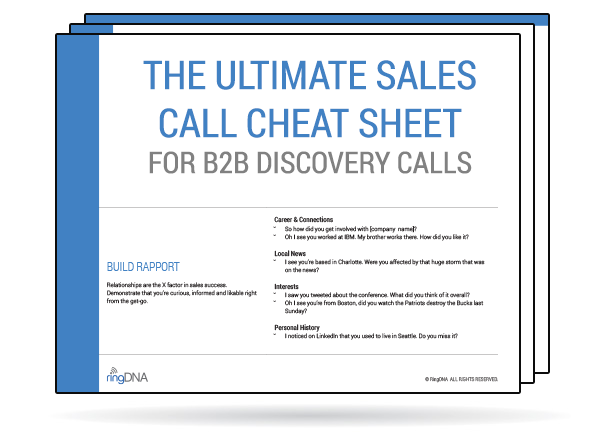Are You Hitting These 7 Key Objectives During B2B Sales Discovery Calls?
For most SDRs, sales discovery calls are in fact the most important sales activity. Sure, emails and social outreach are vital, but conversations with prospects are the only way to differentiate yourself in an increasingly crowded marketplace. The better you know your prospects, their colleagues and their unique needs, the better chance you have of winning their business.
I’ve had the opportunity to listen to hundreds of sales calls here at Revenue.io. The reps that win the most opportunities manage to meet seven key objectives – which are identified below – in the context of a conversation that doesn’t feel scripted or forced. Making sure you gather all the information you need during a conversation that your prospect feels good about is both an art and science. Practice and discipline are important, but mindset is essential. Bringing a genuine curiosity and eagerness to help is key.
Here are the seven things you absolutely must do (for a list of model questions created by our team of sales leaders, check out our B2B Discovery Call Cheat Sheet!).
Build Rapport
Relationships are the X factor in sales. No matter what it is you’re selling, customers are a lot more likely to buy from reps that they like. That’s why it’s so important to demonstrate that you’re curious, informed and likable from the get-go. Some ways to build rapport include asking about their career trajectory, discussing mutual interests and bringing up local news or sports. You can often use social to get an idea of a prospect’s interests before calls to help you prepare.
Identify Needs and Challenges
One of the most important things to remember is that not all prospects are the same. Two prospects at similar companies with the same job title might have completely different pain points and goals. They might have radically different use cases for your offering. That’s why it’s so important to ask questions to scope their needs. One question that I particularly like is, “What part of your job is most frustrating?” The answer offers insight into the best ways your product or service can help.
Establish Technical Compatibility
One of the top priorities should always be establishing whether there are technical roadblocks. Some roadblocks are not going to be surmountable (e.g. they’re locked into a deal with one CRM, but your product is designed to integrate with a different one.) However, some technical roadblocks can be easily navigated. As an example, say you offer a Chrome app for marketers, but some of their team uses Safari. It might be relatively easy to simply get the marketing team to switch to Chrome.
Define the Process
It’s so much easier to move deals forward if you can agree on a process. In order to define a prospect’s process, reps need to:
- Identify key stakeholders
- Identify an executive sponsor
- Discover their process for purchasing new solutions
This empowers reps to move deals forward by following up with relevant stakeholders in the organization.
Gauge Urgency
In order to identify how sales-ready a prospect is, it’s important to try to uncover their buying timeline. If you’re going to be replacing another solution, find out when the contract ends. Discern who is in charge of implementation and whether they have the resources in play to handle implementation successfully.
Identify Competitors
Sure, not all B2B deals are going to be up against competitors. But a lot are. It’s important to not only identify whether deals are competitive but look for ways to win against various competitors. Some key questions to ask include:
- Are you looking at any other products at the moment?
- What has your experience been with ?
- How do you feel about the way we compare to other solutions you’ve looked at?
Plan Next Steps
As calls wind down, it becomes critical to identify next steps. After all, so long as a prospect is qualified, the goal of the call should be to move the deal forward. Toward the end of calls, the best reps tend to ask about how to follow up such as:
- When would be a good time to follow up with you about what we discussed?
- Who else on your team should see the product?
- Have you read any of our case studies? If not, would you like me to send you one?
For a detailed look at questions that support each of these call objectives, check out our B2B Discovery Call Cheat Sheet!
